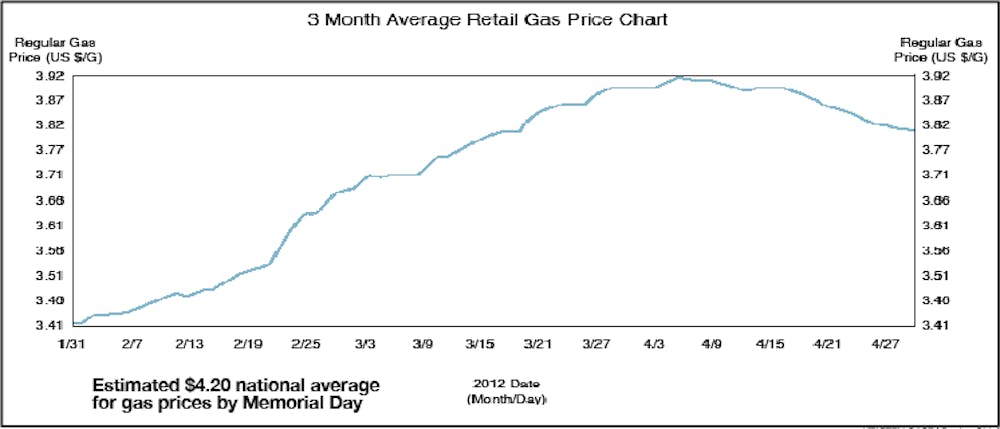Although gas prices are currently dropping, by the end of the month, the national average is predicted to cost a whopping $4.25 per gallon, according to predictions from the Department of Energy.
This news has driven many in the Elon University community to restrict how much they drive and rethink how often they fuel up and even shop for groceries.
Ashley Burns, Elon University pre-doctoral fellow and political science instructor, commutes from Durham to Elon everyday, and despite driving a fuel efficient Honda, she said she is beginning to feel the pressure of filling up at the pump.
“I fill up my car every Monday and Friday,” said Burns. “It costs me about $25 each time.”
Equating to $50 per week just on gas, Burns doesn’t travel much outside of her commute to work because gas prices are squeezing her budget, she said.
Burns also runs a summer program in New Orleans, and the program uses Chevrolet Suburbans to transport the participants to and from destinations.
“Last summer it cost $98 every time we wanted to fill up the Suburban,” Burns said. “I can only imagine how much it will cost this summer to do the same.”
Elon junior Andrew Kidd lives off campus at Campus Trace apartments and takes the Biobus to get to class.
“Taking the bus helps me save on gas,” Kidd said. “That way, I don’t have to waste gas just to get on campus.”
Kidd drives a Dodge Dakota truck, which is not a very fuel-efficient car, he said.
“It usually costs me about $65 to fill up,” Kidd said. “But I drive sparingly, so I only fill up monthly.”
Driving less is an obvious and excellent way to cut down on gas usage, and Anthony Hatcher, associate professor of communications, said he puts this into practice during the summer at his home in Durham.
“I try to ride my bike around Durham when I don’t absolutely need the car,” Hatcher said.
In addition to using alternative methods of transportation, Hatcher also practices fuel-efficient driving habits.
“I also try to drive like a sane person,” he said. “Sometimes I feel I am the only driver on the interstate that knows how to use my vehicle’s cruise control in order to save gas.”
Even with these fuel-saving habits, Hatcher said he still feels as though the commute to Elon is putting a significant strain on his gas tank.
“I certainly use a lot of gas during the academic year,” he said. “But I try to make up for that with driving less during the summer months.”
Hatcher is also a bit skeptical that gas prices will actually spike to $4.25.
“There is no guarantee that prices will spike at $4.25 or higher,” Hatcher said. “I paid $3.77 this week, down from $3.91 last week.”
He said he also feels that many will choose to not travel during the summer months.
“Driving will be up nationwide this summer, but many will choose to stay home,” he said.


